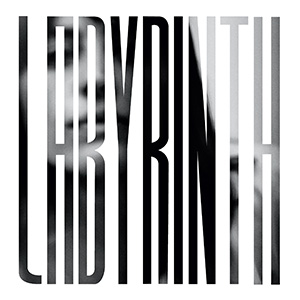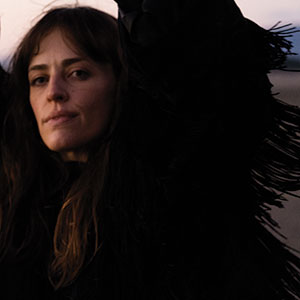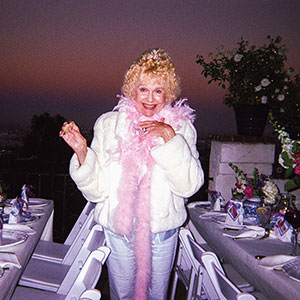Heather Woods Broderick
The word labyrinth is often used interchangeably with the word maze. But unlike a maze — which has multiple branching paths — historians argue that the traditional labyrinth consists of a single path, one that’s been elaborately constructed to unfurl with all of the mystery and incomprehensible beauty of life. Using this definition, completing a labyrinth isn’t about choosing the right path, it’s about choosing to persist at all.
Across her new album Labyrinth, Heather Woods Broderick serves as our reflective host, subverting expectations of conventional songcraft with impressionistic language and quietly relentless explorations of the human experience that’s at once light and dark, more circular and less linear. “Many of us yearn for stillness and peace, as an escape from the movement all around us,” she explains when asked about the themes of the album. “Yet movement is perpetual, happening all the time on some level. It’s as wild as the wind, yet eternally predictable in its inevitability. It is linear in part, but infinite in its circuitry. Our lives just punctuate it.”
So perhaps it’s fitting that Labyrinth begins with an account of the artist on the road. “Driving west at night” she sings on the curtain-raiser “As I Left,” “Getting darker at the same time it’s getting light.” This vignette of Broderick escaping the approach of dawn sets the stage for the rest of the album, a collection of beautifully-sung tone poems that pulse with elements of trip hop, true-to-life songcraft, and occasional peaks of electro-pop grandeur. The songs are also among her most spare to date, reflecting a natural, conscious progression towards being more exposed in her music, with her honeyed vocals upfront and the songs’ essence immediate to listeners.
Broderick began crafting Labyrinth in March 2020, when most forms of movement were brought to a screeching halt. The Maine-born, Los Angeles-based songwriter — who, in addition to her work as a solo musician, built a life playing and touring with acts such as Sharon Van Etten, Beth Orton, Damien Jurado, and Efterklang — was suddenly forced off the road for the first time in her career. She used this disruption as an opportunity to pare down her creation process and construct the scaffolding for Labyrinth in her apartment. Employing only the most crucial tools at her disposal, Broderick found herself opening different artistic doors as she focused on sharpening her recording skills, capturing the majority of the album on her own before finishing the remainder with co-producer D. James Goodwin.
This new DIY approach is evident on tracks like “As I Left,” a stripped-down ballad that sees Broderick contemplating the illusory nature of place and memory when one is constantly traveling. In other moments, her rabbit-from-a-hat essentialism results in songs that feel huge despite their sparse palette; “Crashing Against the Sun” may be the most stadium-ready she has ever sounded, complete with romantic synth-lines, splashing arena drums, and a wide sense of sonic-framing. On the richly-produced “I Want To Go,” Broderick employs a Tricky-esque beat and stabs of distortion as she describes the restless quality of her dreams and a longing to return to the natural world. Her lyrics feel almost venomous on the piano and bass-led “Wherever I Go,” in which she describes an empire “...where the dry land cracks beneath the asphalt...and the colonies of supple grubs fill them up one by one.”
Despite the evocative, often gorgeous songwriting, it’s clear that Broderick isn’t here to comfort or assuage; she’s a painter depicting a landscape, an observant traveler through realms of memory and thought. This becomes particularly apparent on lead single “Blood Run Through Me,” with its skeletal beat and neon-cloaked bassline helping to build the song to soaring, chill-inducing heights. Goodwin and singer-songwriter Lisa Hannigan join Broderick on vocals, providing a brief moment of camaraderie and unity, even as the lyrics describe how “we're tapped out / too much reaching for each other’s lives.” A stillness fills the air on stunning closer “What Does Love Care,” in which Broderick wakes but stays in bed one morning, listening to birdsong and observing the sunlight. Her mind wanders as she imagines the end of the anthropocene, when “the greens are greener than we’ve ever seen.” She contemplates “how happy the bottom dwellers must be / less heavy feet and fewer ships on the sea” amid a landscape of organ and restrained reverberating drums, before asking flatly “it’s all about love, and what does love need?” She answers a moment later, the final words heard on the album: “It doesn’t take much to water the seed.”
For all of Broderick’s sage lyricism and vocal authority, Labyrinth never provides the listener with any easy answers. If the image of the labyrinth represents the enormity of modern life and the difficulty of navigating it, Heather Woods Broderick provides a guide to its endless kinetic wonders — of being present, aware, and connected despite its disconnects. She describes the texture of its walls, its indifferent rhythms, and the inherent poeticism of feeling lost amid the confusion and unexpected turns. At this point in our history, perhaps that’s all we need to keep moving.
Selected Press
It is ethereal and perfect. I just madly love this record
...immediately inspiring, like a day blooming into beautiful life...
…she does a good job of building walls of sound that still maintain an intimate, bedroom-folk feel.
…a collection of beautifully layered, echo-heavy songs that span out in unexpected directions.
gorgeous...beautifully dreamy...carthartic...
…exquisitely beautiful...bathed in sonic radiance…



